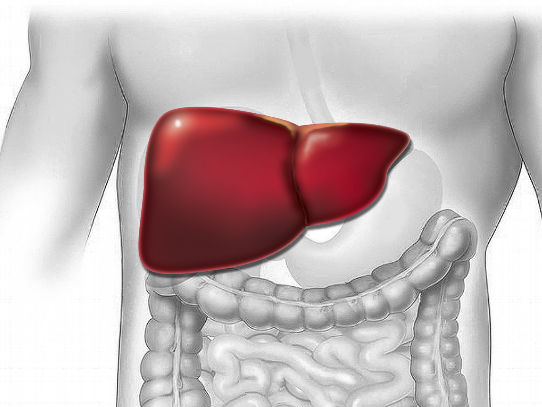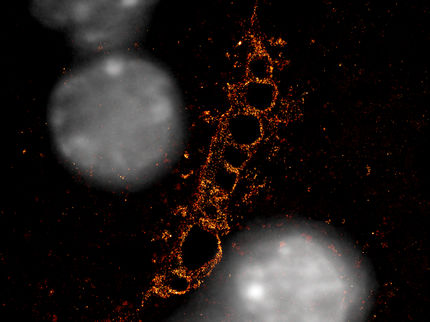Start-up raises hope in the fight against acute and chronic liver diseases
The biotech company HepaRegeniX, founded in 2017, starts clinical testing of the tolerability of its developed drug in volunteers.
Advertisement
The Tübingen-based start-up HepaRegeniX recently began a Phase I clinical trial to test the tolerability of a novel drug against liver disease in healthy volunteers. The drug is a so-called MKK4 inhibitor, which, when administered, curbs the activity of the kinase MKK4. Preclinical studies have shown that the drug has positive effects on liver regeneration. Two scientists from Tübingen, who are co-founders of HepaRegeniX, played a major role in the development of the drug: Prof. Dr. Lars Zender, Medical Director of the Department of Medical Oncology and Pneumology at the University Hospital of Tübingen, and Prof. Dr. Stefan Laufer, Head of Pharmaceutical and Medical Chemistry at the Institute of Pharmacy at the University of Tübingen.

Symbolic image
pixabay.com
Liver disease is a major health problem worldwide and represents one of the leading causes of death. In Germany more than five million people suffer from liver diseases. The causes are manifold and particularly the incidences of alcohol related liver disease (Alcoholic steatohepatitis-ASH) or non-alcoholic Steatohepatitis (NASH) are steadily rising. Fatty liver diseases with their associated chronic liver inflammation represent a major risk factor for the development of hepatocellular carcinoma (HCC), which is one of the most frequent causes of cancer-related deaths worldwide (with more than 750,000 deaths per year). While a healthy liver harbors a striking potential to repair damage and to regenerate, this regenerative capacity is lost in diseased livers.
So far, no drugs to restore liver regeneration in diseases livers have been available. The only established treatment for acute liver failure and end stage liver disease is liver transplantation, however the paucity of donor organs and the need for lifelong immunosuppression of the recipient complicates the approach. With the development of HepaRegeniX´s MKK4 inhibitor, a long-term dream of scientists and hepatologists seems within reach: unlocking regeneration with a pharmacological approach. "Since our research group first described the role of MKK4 as a key regulator of liver regeneration in 2013, we are now a big step closer to its application in humans with the start of the first clinical trial," emphasizes Prof. Zender. Before the idea of a spin-off even arose, he made the groundbreaking discovery in 2013 that inhibiting the kinase MKK4 can trigger the self-healing function of a damaged liver.
"When HepaRegeniX started operationally in 2017, none of us had any idea that we would be able to start a first clinical trial just four years later. This is truly a milestone and we hope to be able to test the efficacy in patients with acute and chronic liver diseases as soon as possible," adds Prof. Laufer, in whose research group the medicinal chemistry work on the first MKK4 inhibitor HRX-0215 was carried out. There is a close research collaboration between the start-up, the University Hospital and the University of Tübingen, which means that the start-up benefits immensely from the research environment at the Tübingen site. With the "Tübingen Center for Academic Drug Discovery & Development" (TüCAD2), supported by the Excellence Strategy of the University of Tübingen, the university has its own academic center for drug discovery and development, whose co-founder and spokesperson is Prof. Laufer. The goal of TüCAD2 is to identify, validate and develop innovative drug candidates and their translation into the clinic. Meanwhile, the University's designation as a University of Excellence and the only oncology cluster of excellence in Germany, the cluster “Image-Guided and Functionally Instructed Tumor Therapies” (iFIT), unite the research expertises of the University and the Hospital in the field of innovative cancer therapies at the highest level. Prof. Zender, who is spokesperson for the iFIT Cluster of Excellence, was instrumental in developing a screening platform that identifies targets for new drugs. "The start of our clinical trial with the newly developed MKK4 inhibitor nicely illustrates the very well-functioning interdisciplinary collaboration of the different research disciplines within TüCAD2 and underlines Tübingen's role as a leading institution in the field of academic drug development," says Prof. Zender.
Other news from the department research and development
Most read news
More news from our other portals
Something is happening in the life science industry ...
This is what true pioneering spirit looks like: Plenty of innovative start-ups are bringing fresh ideas, lifeblood and entrepreneurial spirit to change tomorrow's world for the better. Immerse yourself in the world of these young companies and take the opportunity to get in touch with the founders.




















































